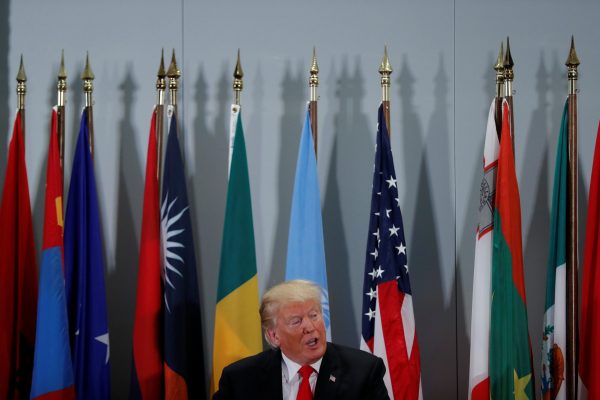Washington is increasingly critical of China. During a recent speech, Vice President Mike Pence castigated Chinese activities ranging from unfair industrial and trade policies to perceived interference in US domestic politics. To address such challenges and deter further adventurism, Washington has begun to employ a range of tools including tariffs and military operations in contested regions. President Trump has also prioritised direct conversations with Xi Jinping. A meeting may occur as soon as next month’s G20 summit.
US officials are deeply sceptical about the United Nations, criticising it as a threat to US sovereignty and lambasting the skewed distribution of financial responsibility. The 2017 National Security Strategy mentioned the UN only briefly as an organisation that can help solve many global issues but that is in need of reform. During his September speech to the UN General Assembly, President Trump said that Washington would distance itself from two key forums — the Human Rights Council and the International Criminal Court — until reforms were made.
Although often an object of scepticism and derision, the UN can support Washington’s evolving China strategy in two ways.
The UN can facilitate coordination and cooperation between the two states when their interests coincide. In recent years, Washington and Beijing have cooperated effectively in the UN Security Council on several key issues, including developing sanctions that brought Iran and North Korea to the negotiating table. That cooperation has continued despite variations in the broader bilateral relationship. In the first nine months of 2018, the two countries agreed in about 70 per cent of Security Council votes and used the veto only sparingly.
Sustained cooperation in the UN can support US–China relations as tensions flare up in other areas, such as trade and disputes in the South China Sea. It would highlight the Trump administration’s commitment to a ‘constructive relationship with Beijing’ and demonstrate that both sides can work together despite their differences. Cooperating in practical areas such as human trafficking, transregional terrorism and nuclear non-proliferation would also promote international stability.
Yet there are limits to this cooperation. With bolder foreign policy under Xi Jinping, Beijing is more likely to oppose the UN authorising US use of military force, evident in recent Chinese vetoes on the Syria issue. Previously, China deferred to Russia or France in opposing US-led military operations, including the 1999 NATO campaign in Kosovo and the 2002–3 Gulf War. Less concerned with US criticism, China might also be more assertive with its veto power to protect problem regimes such as North Korea.
The UN is also an important venue for ideological contestation between the two powers. In a recent essay, Aaron Friedberg argues that China regards ideology as an ‘important domain of competition’. Beijing sees the US promotion of democracy and liberal human rights norms as a way of instigating discontent within and around China. In response, Beijing promotes alternative values including strict sovereignty norms and an emphasis on social and economic development over human rights. Many foreign observers were concerned at China’s 19th Party Congress work report, issued in October 2017, which suggested China’s authoritarian governance model should be exported to developing countries.
China has increasingly pursued this agenda in the UN. Examples include recent China-sponsored resolutions in the Human Rights Council to subtly dilute liberal terms and to prioritise national development over civil and political liberties. Beijing has succeeded in many of these cases.
China has also prodded senior UN officials to lend support, and thus legitimacy, to the Belt and Road Initiative (BRI), which many analysts critique for undermining liberal values through questionable infrastructure loans to authoritarian states.
US strategists should expect these activities to continue. China may leverage BRI partners to shield rogue regimes in UN forums and reject resolutions that advance liberal norms. Beijing may also build coalitions, along with Russia, to reorient the focus of peacekeeping missions away from human rights abuses. For example, both countries recently abstained on a resolution to extend the UN mission in the Western Sahara due to a human rights monitoring provision. Beijing might also nudge UN bureaucracies such as the Department of Economic and Social Affairs, led by a Chinese diplomat since 2007, to promote China’s governance model through seminars, reports and other activities.
Redoubling US diplomatic engagement with UN forums allows the US to continue promoting its values while responding to China’s more activist posture in UN deliberations. This will require close coordination with US allies and the politically unpalatable steps of re-joining the Human Rights Council and sustaining US contributions to the UN. Failure to compete effectively on the ideological plane could present a new opportunity for China.
Dr Joel Wuthnow is a Research Fellow in the Center for the Study of Chinese Military Affairs at the National Defense University, Washington. This piece represents only his views and not those of NDU, the Department of Defense, or the US government.

